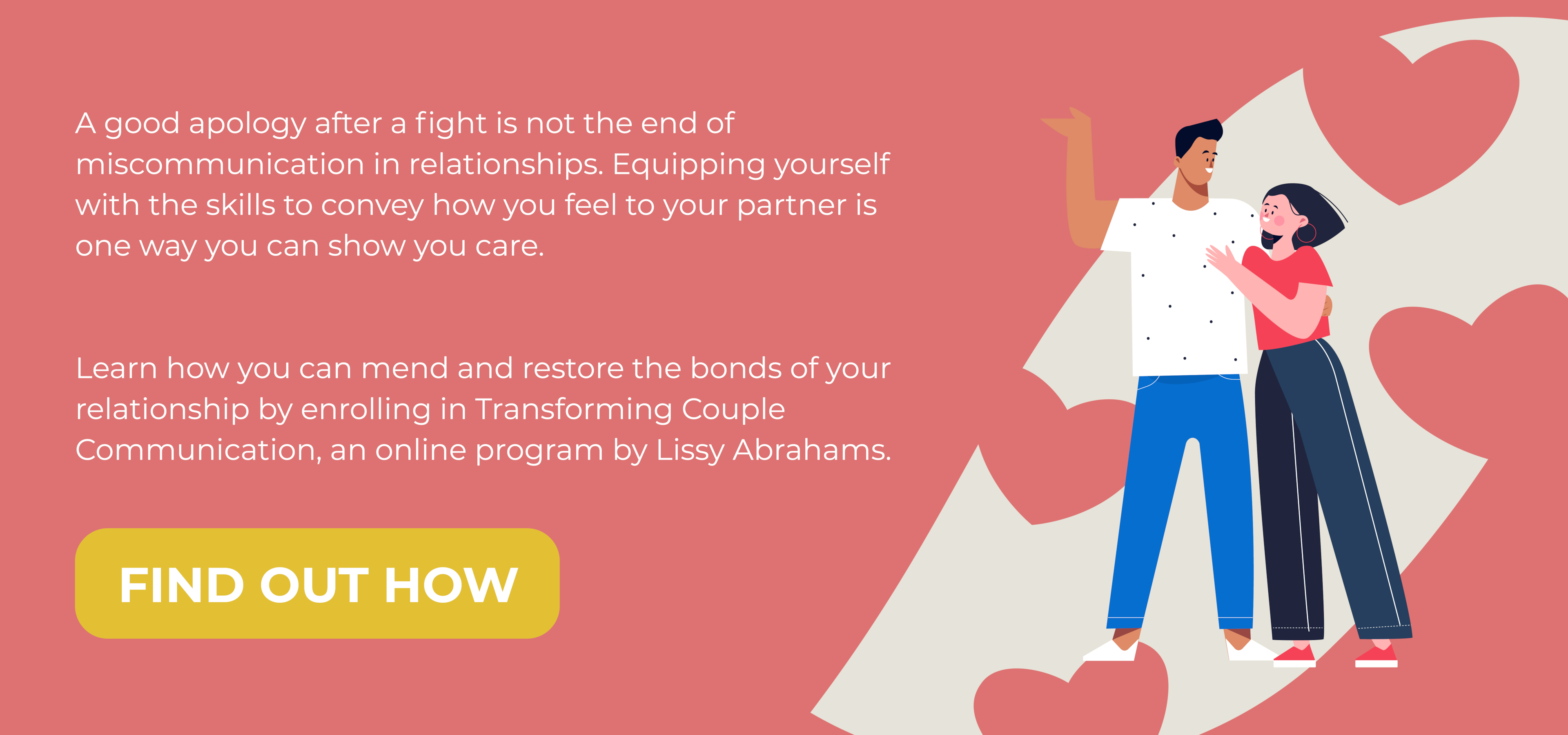How to Apologize to Your Partner: Why it's More Than Saying Sorry

We've all made mistakes while navigating our relationships. Whether it's a simple misunderstanding or a huge conflict, understanding how to apologize to your partner is vital for repairing relationships and nurturing each other's emotional well-being.
Apologizing goes beyond saying the words "I'm sorry." It's also not about making such a big deal when acknowledging did you someone wrong or caused hurt. It's not about making an excuse or even needing to explain what happened and what actions caused your hurtful behavior. It's not about empty promises for change in the future. It's a skill that requires self-awareness and a genuine commitment to use your words and genuinely see another person. Grasping this nuanced art equips us with the tools to navigate the intricacies of connections.
With this guide, my goal is to provide insights and strategies derived from the realm of psychology that may assist in restoring bonds and fostering happiness and harmony. So, whether you're struggling to express remorse or seeking ways to strengthen your relationships, you've come to the right place.
Building the Foundation to Understand Apologies
Exploring the significance of apologizing in relationships is crucial to learning how to apologize effectively. Apologies go beyond simply acknowledging a mistake. They play a role in our social interactions and serve as a tool for healing emotions resolving conflicts and building strong connections.
A well-executed apology has the power to mend relationship fractures and nurture trust and compassion expediting the healing process.
What Defines a Good Apology

Although it may seem straightforward at a glance, the process of providing an effective apology can be as intricate as the relationships in which it is practiced. Bad apologies are more prevalent than good apologies, and I hear the hurt and damage they cause in my consulting room. They are often tinged with excuses, lengthy descriptions of what happened, and promises for future changes which may or may not lead to change.
The thing is we can hurt a person's feelings in any kind of relationship. They could be a friend, family member, or colleague. We may feel bad, but when we make an excuse because we're unable to say sorry, we don't accept responsibility for our own actions or behavior where we have potentially wronged someone. We may offer a half-baked response that can even make things worse.
Understanding how to offer a successful apology not only helps mend relationships but also strengthens connections and promotes empathy. Taking responsibility when we wrong a person is a hallmark of emotional maturity.
How to Apologize — Why is it Often So Challenging to Offer Sincere Apologies?
As we navigate the complexities of connections it becomes crucial to understand how to offer a sincere apology. This involves understanding the cognitive processes that drive these expressions of remorse.
Offering an apology isn't just admitting a mistake or offering an example of what happened. It's also practicing empathy, vulnerability, emotional healing, and a commitment to fostering relationships.
By unraveling the intricacies of apologizing, we pave the way for managing conflicts and building bonds. Along this journey, we will also address the obstacles people face when trying to offer heartfelt apologies. Let's explore further.
A Good Person Can Offer a Bad Apology Without Realizing

Generally speaking, taking responsibility can be quite complex, as they involve emotions like guilt, vulnerability and the fear of rejection. An apology is more than admitting a mistake, it's about showing empathy to a person for the pain caused by that error.
We often don't want to say a hurtful thing or use certain words that seem like putting the blame on the other person. Sometimes in a conversation it can just happen, and with a bit of a forceful tone or a raised voice or a dismissal of a friend, our actions cause this person to hurt.
At the Heart of Admitting a Mistake is Your Sense of Self
At the core of understanding how to apologize lies the ability to comprehend that you have hurt someone's feelings. This requires empathy. Empathy helps us acknowledge the pain or discomfort our actions might have caused another person during the apology. Additionally, apologies require vulnerability — the courage to admit our mistakes and face any consequences.
The problem is when our ego comes into play that when things can easily go off track. Fear of being seen as wrong, blamed, or weak act as obstacles to offering a sincere apology. If we have a fragile sense of self, it makes it harder to accept the blame or reveal your regret for the hurt caused. It's not about trawling over what happened or a lengthy conversation.
Therefore, achieving mastery in the art of apologizing necessitates gaining an understanding of these identity barriers and finding ways to overcome them.
In the following discussion we will explore how effective apologies positively impact our relationships and emotional well-being.
Lessons Learned: Examples of How Apologies Repair Relationships
Case Study 1: The Forgotten Anniversary
Amber and Josh, married for ten years, found themselves in turmoil when Amber forgot their big anniversary. Josh felt neglected and unappreciated. And while Amber was consumed with regret, she struggled to express her remorse effectively.

For Josh, the most important part was that Amber went the wrong way about it when he expressed what he felt. It upset even him even more when he heard Amber try to explain herself and make excuses, even one about needing to drop off the dry cleaning to the laundromat. Their disagreement led to a cold silence in the house, affecting their mental health and wellbeing.
Through discussions in therapy, they both learned the value of being more open, vulnerable, and being able to truly see each person more. Amber asked for Josh's forgiveness and gave a promise to be more careful in the future.
Case Study 2: The Misunderstood Message
Samantha and Milly, a long-term couple, experienced a significant rift due to a miscommunication via text. Samantha, having a particularly stressful day, received a message from Milly that she perceived as dismissive and uncaring. Her emotional response led to an argument, with both parties feeling hurt and misunderstood.
During a session in therapy where we discussed their argument, they were able to use this example to realize the impact they had on each other. Milly felt guilt for mocking Samantha and expressed remorse for her mocking behavior.
For Reading More on How to Apologize
"Why Won't You Apologize? Healing Big Betrayals and Everyday Hurts” is a thought-provoking book written by psychologist Dr. Harriet Lerner that explores why some people struggle with apologies. It also emphasizes the impact of a heartfelt apology in repairing a relationship.
Beverly Engel's "The Power of Apology: Healing Steps to Transform All Your Relationships" talks about how to sincerely say you're sorry and deal with people in your life who refuse to apologize while bringing about healing and transformation.
In "The Five Love Languages of Apology," authors Gary Chapman and Jennifer Thomas delve into how people express and accept apologies, influenced by what they refer to as "languages of apology." This book proves useful for individuals seeking to improve their understanding and connection with friends, family members, and loved ones.
Exploring reading material is a way to deepen your knowledge of apologizing. This will enhance your ability to apply it effectively in personal and professional relationships.
Frequently Asked Questions about How to Apologize
What is the way to apologize?
To offer an apology, one must acknowledge the mistake, genuinely express regret, take responsibility for their actions, and offer to make amends. It's crucial to empathize with the emotions experienced by the person you've hurt and demonstrate remorse.
What are five ways to offer an apology?
Psychologist Gary Chapman suggests five ways to express an apology:
-
Expressing regret ("I'm sorry")
-
Taking responsibility ("I made a mistake")
-
Making amends ("How can I make it right?")
-
Genuinely repenting ("I promise not to repeat it")
-
Requesting forgiveness ("Will you forgive me?")
How can you apologize politely?
Polite apologies require respect.
They involve acknowledging your fault and showing understanding towards the person's feelings. Using sincere language, being honest about your mistakes, actively listening to the person you've wronged, and finding a mutually agreeable solution are key elements of a polite apology.
What is the effective approach to apologize?
The effective way to offer an apology is through personal communication. Expressing phrases like "I am truly sorry, for..." or "I sincerely apologize for..." can demonstrate remorse. Take note — the sincerity of an apology extends beyond words and encompasses tone, intention, and subsequent actions.
The Positive Impact of an Apology — the Gift That Keeps on Giving
Apologies have an impact when it is evident that you genuinely comprehend the consequences of your actions and are willing to make changes.

In our exploration of the significance of apologies in repairing relationships and improving communication, we have delved into the psychology behind it and how this operated in real life situations.
The path to delivering an apology is truly profound. Remember that the way you apologize matters as it reflects your sincerity and willingness to take ownership with emotional maturity.
Now it's your chance to incorporate these insights into your life. Making apologies when necessary is not a sign of weakness — quite the opposite as it demonstrates strength. Taking these steps forward to enhance your relationships requires dedication, both in terms of time and emotional investment.
If this article has resonated with you and you are eager for a comprehension alongside practical strategies to enrich your relationships, take the next step and enroll in my online program, Transforming Couple Communication. It's all about building a foundation for happier relationships and a more fulfilling life through effective communication, including the art of apologizing.
To gain an understanding of emotional competencies, I encourage you to explore my online programs, which you can do at your time and pace. These programs are specifically designed for individuals committed to transforming their relationships and fostering an understanding and loving lifestyle. Reap the rewards of relationships in the long run. Begin today.



